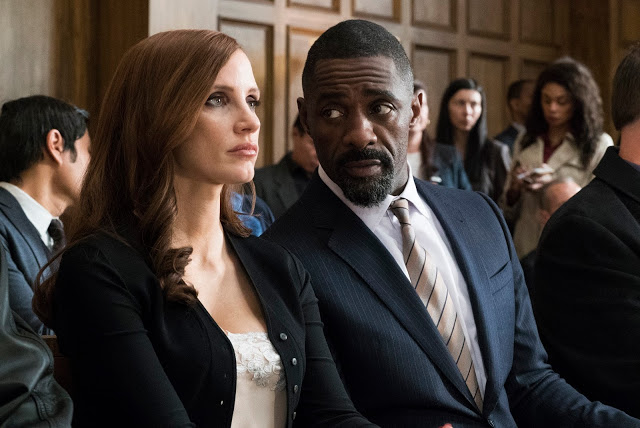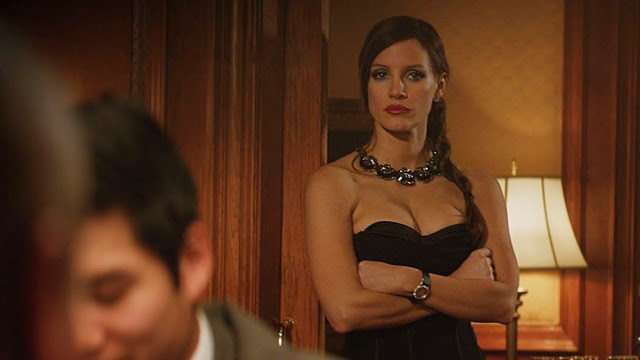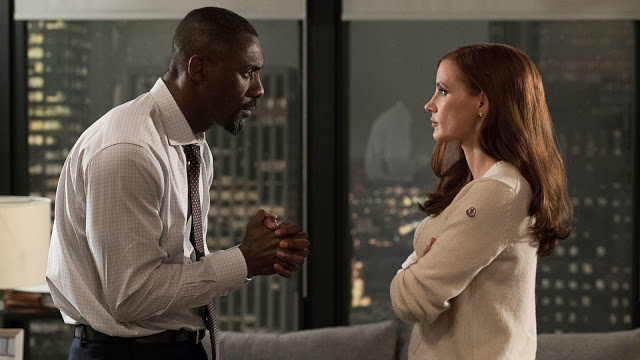Molly’s Game is about an obscenely intelligent drug addict who wields her intellect and verbal dexterity to achieve professional fortune and personal satisfaction. Which drug addict, you might ask? The film’s protagonist is Molly Bloom, the so-called “Poker Princess” who ran outrageously high-stakes games of Texas hold ’em for movie stars, hedge fund managers, socialites, and other reprobates. But scrub the gender-specific pronoun from the description, and we could just as easily be talking about Aaron Sorkin, the uber-literate Oscar-winner who battled substance abuse on his way to becoming one of America’s most recognizable and divisive wordsmiths. It’s easy to see what attracted Sorkin to Bloom, and to perceive Molly’s Game—his crackling, robustly entertaining directorial debut—as a kind of cracked-mirror self-portrait, as well as a flick about a babe with brains.
Yet even if Molly’s Game is in part a stealth vanity project for Sorkin, it also functions as a well-calibrated response to one of the most common complaints lobbed against him: his inability to write strong roles for women. With her sky-high stilettos and low-cut cocktail dresses (“the Cinemax version of myself”), Molly can occasionally suggest a male screenwriter’s fantasy of feminine sexuality—in fact, she makes this very point to one of her clients who pathetically confesses his love for her—but she is too forceful a presence to be reduced to a mere object. Brought to flaring, ferocious life by Jessica Chastain, Molly reveals herself as a number of things over the course of the movie—a manipulator, a visionary, a lamb, a lioness—but in no way is she a minor player.
Certainly the FBI didn’t think so, not when it indicted her in 2013 on racketeering charges and accused her of liaising with the Russian mob. That indictment forms the ostensible basis for Molly’s Game, which operates on a surface level as a slick and compelling legal procedural. Drowning in debt and hopelessly overmatched in court, she begs for help from Charlie Jaffey (a terrific Idris Elba), a high-powered defense attorney with a smashing corner office and a precious preteen daughter. After Charlie’s conscience compels him to take Molly on as a client—one of the movie’s best sight gags takes place at her arraignment, where Charlie constantly switches seats with an associate so that he can better appraise this poker pariah—the film enters the morass of plea negotiations, which Sorkin depicts here as an ethical dilemma: Molly can reduce her sentence and avoid prison, but only if she fully informs on her clients, thereby shattering their family’s lives and forfeiting her own dignity in the process.
This positing of Molly’s plea deal as a Faustian bargain is perhaps oversimplified, but it’s a minor misstep, given that all the legal maneuvering is largely tangential. The majority of the film takes place in flashback, chronicling Molly’s proverbial rise and fall: how she went from aspiring Olympian to incoming Harvard Law student to cocktail waitress to gambling impresario. It’s breathlessly paced, opening with an avalanche of words and images illustrating how Molly nearly paralyzed herself in a freak ski accident during the Olympic trials. (The accident is fictional, as is much of the film; if this bothers you, go read a book.) As a former playwright-turned TV showrunner, Sorkin has always been renowned (and in some circles reviled) for his words, yet early in Molly’s Game he seems resolute on counteracting that label, deluging the audience with rapid-fire montage and whiplash editing. It’s a strenuous effort, and you can get the whiff of a first-time director trying a tad too hard, even if you can also admire Sorkin’s precision, the fastidious way he synchronizes sight and sound.
Gradually, the images slow down; the words, however, never slacken. Working loosely from Bloom’s book, Sorkin conveys a tremendous amount of information in Molly’s Game, not just about his heroine’s glamorous life but also about the seedy underbelly of high-stakes gaming, the spiraling cycle of drug addiction, and even the vagaries of the criminal justice system. (For any documentarians inclined to make a damning exposé, might I point you toward the vulgar scheme that is civil forfeiture?) To do so, he relies heavily on Chastain’s nonstop voiceover, an unusual crutch for a writer who typically streamlines his verbiage in the form of bantery, back-and-forth bloodsport rather than using it as a vehicle for exposition. Still, the constant narration never deadens the film’s energy, in large part because Molly’s descriptions are inherently interesting. As she explains how she systematically built a poker empire—relying variously on narcotics, Playboy playmates, and the goodwill of her players (portrayed by skilled character actors like Bill Camp, Chris O’Dowd, and Brian d’Arcy James, plus a badly miscast Michael Cera)—you’re less likely to tune out than lean in.
Speaking of leaning in, Molly’s Game is cognizant of the rampant sexism that smothers Molly like a noxious gas, the men in her orbit eyeing her like a prize rather than crediting her as a savvy proprietor who generously plies them with Cristal and Patrón while simultaneously feeding their habit. Yet she’s still an Aaron Sorkin character, which means she comes armed with sharp quips, deep scorn, and daddy issues. The latter are on hand courtesy of Kevin Costner, who in flashbacks plays Molly’s father, Larry, a domineering psychologist who pushes her to the brink of destruction in the name of betterment.
Costner’s punishing patriarch encapsulates the best and worst of Sorkin, who likes to punctuate his rat-a-tat exchanges with glorious, grandiose speechifying. At times, this can feel terribly engineered, as in a late scene on a park bench when Larry resolves to illuminate the root emotional causes of Molly’s present turmoil; though it’s beautifully performed by Costner, it nevertheless blares with artificiality and mawkishness. (While therapy has animated some of Sorkin’s best work—such as “Noel”, one of The West Wing’s finest episodes—he’s always taken a frustratingly reductive view of the process, painting the Talking Cure as a silver bullet to be fired by hyper-perceptive wizards.) But when it works (see: most of Steve Jobs; all of The Social Network), it can be downright exhilarating, as when Charlie delivers a righteous defense of his client’s hidden decency.
And really, there is just enormous pleasure to be derived from watching talented actors tear into Sorkin’s dialogue, which here is characteristically musical but rarely feels overly stylized. That’s why the best scenes in Molly’s Game take place not in poker rooms or in courthouses or on ski slopes, but in the roomy confines of Charlie’s law office, where he and Molly snipe, shout, cajole, and debate. These blustery tête-à-têtes also serve as natural showcases for the performers, who meet the challenge splendidly. Chastain is a force of nature, emphasizing Molly’s bristling intelligence and fierce pride as well as her mounting helplessness; crucially, she refuses to make Molly too sympathetic, which makes her uncertain fate all the more disturbing. And Elba, perhaps recognizing his costar’s primacy, wisely underplays his part, bringing Charlie to sly life with small kernels of anger, exasperation, and wit.
Charlie also might be the only person in Molly’s Game who isn’t hooked on anything. Addiction is everywhere in this film, and not just among its habitual high rollers, its coke-snorting hero, or the manic man behind the camera. It can also be found in the audience, at least for those of us who take rapture in Sorkin’s exquisitely crafted prose and burnished arrogance. Molly’s Game is an imperfect movie, sure, but it has an undeniable personality, an electricity, that makes me excited for its creator’s next project. Huh, look at that: It’s only been three days since I greedily devoured Sorkin’s latest torrent of words, and already I’m hankering for a fix.
Jeremy Beck is the editor-in-chief of MovieManifesto. He watches more movies and television than he probably should.




